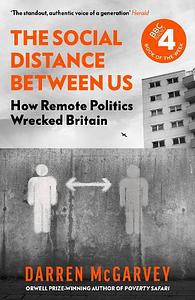Take a photo of a barcode or cover
dark
informative
reflective
sad
slow-paced
This book lays bare the facts that confirm Britain is a country divided, one that is still in the grasp of class warfare. Reading this book really annoyed me & not because it was a bad read, but because so much of what I read showed exactly how the system is still loaded against those in poverty, the working class, long term sick, & those with disabilities. As someone with long term health issues I live it but it still surprised me how insidious class privilege is in twenty-first century Britain. Where you are born & who your parents are still play a huge part in your health & life expectancy, your education prospects, & how successful you are likely to be, & the veneer of meritocracy is exposed to be a smokescreen, a mirage.
The rules are decided a group of people, many of whom are privately educated, personally wealthy & from the middle & upper classes, who have rarely suffered through the severe hardship that poverty brings, some even being 'parachuted' into safe parliament seats. The author asks: how can those who are socially removed or at a distance to those experiencing these problems fully empathise & legislate accordingly? For example, how can a millionaire Chancellor of the Exchequer know how it feels to try & survive on Job Seekers? The author doesn't tirade against the middle & upper classes as being deliberately harmful or fundamentally bad people but argues that this "social distance" disproportionately harms those who are already the most vulnerable.
Towards the end, the author makes some suggestions as to what would need to happen to get Britain back on a more even keel, such as scrapping the two-tier education system, & ensuring workers are represented on company boards. I'm not sure about making voting mandatory, but I do believe that our politicians need more real life experience before carving out a career in politics. .Anyone who has seen the deeply unjust way that the working class, the unemployed, & those with disabilities were treated both during & after the Covid pandemic knows that something needs to change. Read this it's a damning indictment of all that is wrong with modern Britain.
My thanks to NetGalley & publishers, Ebury Publishing/Penguin Random House UK, for the opportunity to read an ARC. I am voluntarily giving an honest review.
The rules are decided a group of people, many of whom are privately educated, personally wealthy & from the middle & upper classes, who have rarely suffered through the severe hardship that poverty brings, some even being 'parachuted' into safe parliament seats. The author asks: how can those who are socially removed or at a distance to those experiencing these problems fully empathise & legislate accordingly? For example, how can a millionaire Chancellor of the Exchequer know how it feels to try & survive on Job Seekers? The author doesn't tirade against the middle & upper classes as being deliberately harmful or fundamentally bad people but argues that this "social distance" disproportionately harms those who are already the most vulnerable.
Towards the end, the author makes some suggestions as to what would need to happen to get Britain back on a more even keel, such as scrapping the two-tier education system, & ensuring workers are represented on company boards. I'm not sure about making voting mandatory, but I do believe that our politicians need more real life experience before carving out a career in politics. .Anyone who has seen the deeply unjust way that the working class, the unemployed, & those with disabilities were treated both during & after the Covid pandemic knows that something needs to change. Read this it's a damning indictment of all that is wrong with modern Britain.
My thanks to NetGalley & publishers, Ebury Publishing/Penguin Random House UK, for the opportunity to read an ARC. I am voluntarily giving an honest review.

